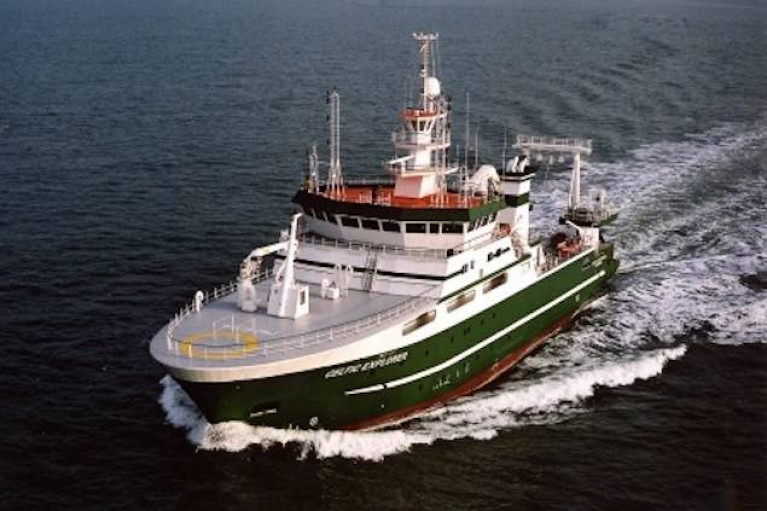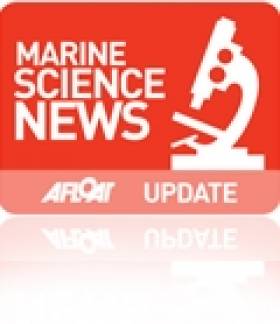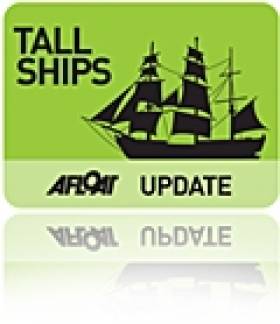Displaying items by tag: research vessel
Marine Minister Confirms Funding for New Marine Research Vessel
Minister for Agriculture, Food and the Marine, Charlie McConalogue T.D., has earmarked the purchase of a new marine research vessel for the State in his Department's 2021 Budget.
As Afloat previously reported, €25m was allocated in Tuesday's budget to progress the construction of the vessel.
In making the announcement Minister McConalogue said: "The budget provision will allow the Marine Institute to progress construction on the replacement of the 21-year-old Celtic Voyager with a new 54m modern research vessel that will provide critical national infrastructure to enable Ireland to address the considerable challenges of Brexit and the Common Fisheries Policy as well as climate-induced impacts on our oceans."
 Celtic Voyager - 21 years old and in need of replacement Photo: Bob Bateman
Celtic Voyager - 21 years old and in need of replacement Photo: Bob Bateman
Welcoming the news Dr Paul Connolly, CEO Marine Institute said: "The Marine Institute is delighted that work can continue on the replacement for the Celtic Voyager. This new vessel will enable Ireland to develop the best scientific advice possible to maximise economic opportunities for our coastal industries and communities and ensure a sustainable resource for them".
The construction of the new national research vessel will continue in 2021 with the build process expected to be completed in summer 2022. Spanish shipyard Astilleros Armon Vigo S.A. were awarded the contract to build the new marine research vessel for Ireland last year, following an extensive EU tender process.
Set to be one of the most advanced marine research vessels in the world, Ireland's new marine research vessel will enable Ireland to undertake critical research work to deepen our understanding of our oceans and our natural resources.
The new vessel will be able to go to sea for at least 21 days at a time and will be designed to operate in harsh sea conditions. Based in Galway, the vessel will be used by the Marine Institute, other State agencies and universities to undertake fisheries research, oceanographic and environmental research, seabed mapping and other multidisciplinary surveys. It will also maintain and deploy weather buoys, observational infrastructure and our Remotely Operated Vehicle (ROV Holland I).
The new vessel will be a sister ship to the State's largest research ship, the 65m RV Celtic Explorer and will replace the RV Celtic Voyager. The two Marine Institute research vessels currently in operation (RV Celtic Explorer and RV Celtic Voyager) are among the most intensively used research vessels in the world. The Marine Institute's RV Celtic Voyager is Ireland's first purpose built research vessel. It has been utilised heavily since its delivery 21 years ago and has been vital in providing marine scientists, researchers and its crew members, with many years of valued experience at sea, expanding and strengthening marine science in Ireland to help inform decisions affecting our ocean.
According to Dr Connolly, "The significantly enhanced capabilities of the vessel will help our researchers, educators, students and the public gain a deeper understanding of the ocean. Most importantly it will facilitate work that will support many of the projects outlined in the Programme for Government including fisheries assessment, offshore renewable energy, marine spatial planning, marine protected areas and research in the area of blue carbon."
Capital funding of €1.5m has also been allocated to the Marine Institute in Budget 2021, and funding for national research investment in marine-related activities will align with the Programme for Government and the needs of decision-makers.
Speaking about the additional funding announced in Budget 2021 Dr Connolly, said that "Research investments will add value to the core services provided by the Marine Institute to their national and international clients, including the Department of Agriculture, Food and the Marine. This new research data and knowledge will strengthen our scientific and technical advice to better inform decision-making on the sustainable management of our ocean and seas".
In 2021, the Marine Institute plans to fund a call for a large-scale project for researchers to investigate the potential for carbon storage and sequestration in Irish waters. This was highlighted as an important priority area for the Marine Institute in the Programme for Government. The work will examine a range of potential carbon storage alternatives such as algal absorption, seagrass forestry, deep-sea sinks, seabed layering and shellfish farming.
In welcoming the research expenditure allocations announced in Budget 2021, The Minister of State at the Department of Agriculture, Food and the Marine, Martin Heydon, T.D. said that "If we are going to continue to deliver efficiency and sustainability in the years ahead, innovation will be critical". The Minister also pointed out that the combined investment in Research and Innovation by the Department, Teagasc and the Marine Institute is now over €60m annually.
#marinescience – Minister of State with responsibility for Natural Resources at the Department of Communications, Energy & Natural Resources, Joe McHugh T.D., today formally commissioned the INFOMAR Programme's new survey vessel, naming her the RV TONN at the Poolbeg Yacht, Boat Club & Marina.
As part of Ireland's national marine mapping initiative, the INFOMAR programme carries out hydrographic & geophysical surveys of Irish territorial waters. It is a cooperative programme between the Geological Survey of Ireland and the Marine Institute and is funded by the Department of Communications, Energy and Natural Resources.
Minister McHugh said "The INFOMAR programme is unique among the various projects funded by my Department, DCENR, in that, for 6 - 8 months of the year, the Infomar team of marine survey specialists live and work among the Irish coastal communities around the entire coast of Ireland." The Minister went on to say one of the achievements of the INFOMAR programme is the focus on disseminating new information on the Irish offshore, which is available free on the http://www.infomar.ie/data/ website. The Minster added "A really good example of the applied use of INFOMAR data is the smartphone App produced jointly by the Irish Underwater Council and INFOMAR, which affords a user access to The Wild Atlantic Way/Dive & Snorkelling sample locations.
The RV Tonn, is named appropriately after the Irish for wave, as it both operates on the waves and uses sound waves to investigate the depth and nature of the seabed. It is a new state of the art vessel, only 8 metres in length, but purpose built to carry out very shallow survey work. It was built by Cheetah Marine in the Isle of Wight after an open tender process.
This new vessel, RV Tonn, will support the completion of the first phase of the Infomar Project's mapping of three priority Areas and 26 priority bays, by the end of 2015.
Welcoming the launch, Koen Verbruggen, Director of the Geological Survey of Ireland, said "Up-to-date advanced mapping, facilitates greater awareness of Irish marine opportunities."
IWDG Hopes Day Trips Will Keep Celtic Mist Afloat
#TALL SHIPS - Not only has the Celtic Mist finally been lifted into dry dock for refurbishing this week, but the Irish Independent reports that day trips will be offered on the yacht when it returns to the water next summer.
As previously reported on Afloat.ie, the one-time personal yacht of the late Taoiseach Charles Haughey is being repurposed as a research vessel by new owners the Irish Whale and Dolphin Group (IWDG) at a cost of some €60,000.
In an effort to help fund the 52-foot ketch's refit bill and its estimated €20,000-per-year running costs, members of the public who pay €50 for a 'Celtic Mist Certificate' will be entitled to a day's sailing on board the newly retitled RV Celtic Mist.
IWDG co-ordinator Dr Simon Berrow said: "We've a lot of work to carry out on the yacht before we can take it out for research," IWDG co-ordinator Simon Berrow told the Independent. "We are confident that we can raise the money to run it."
Here's a link to a TV3 clip































































